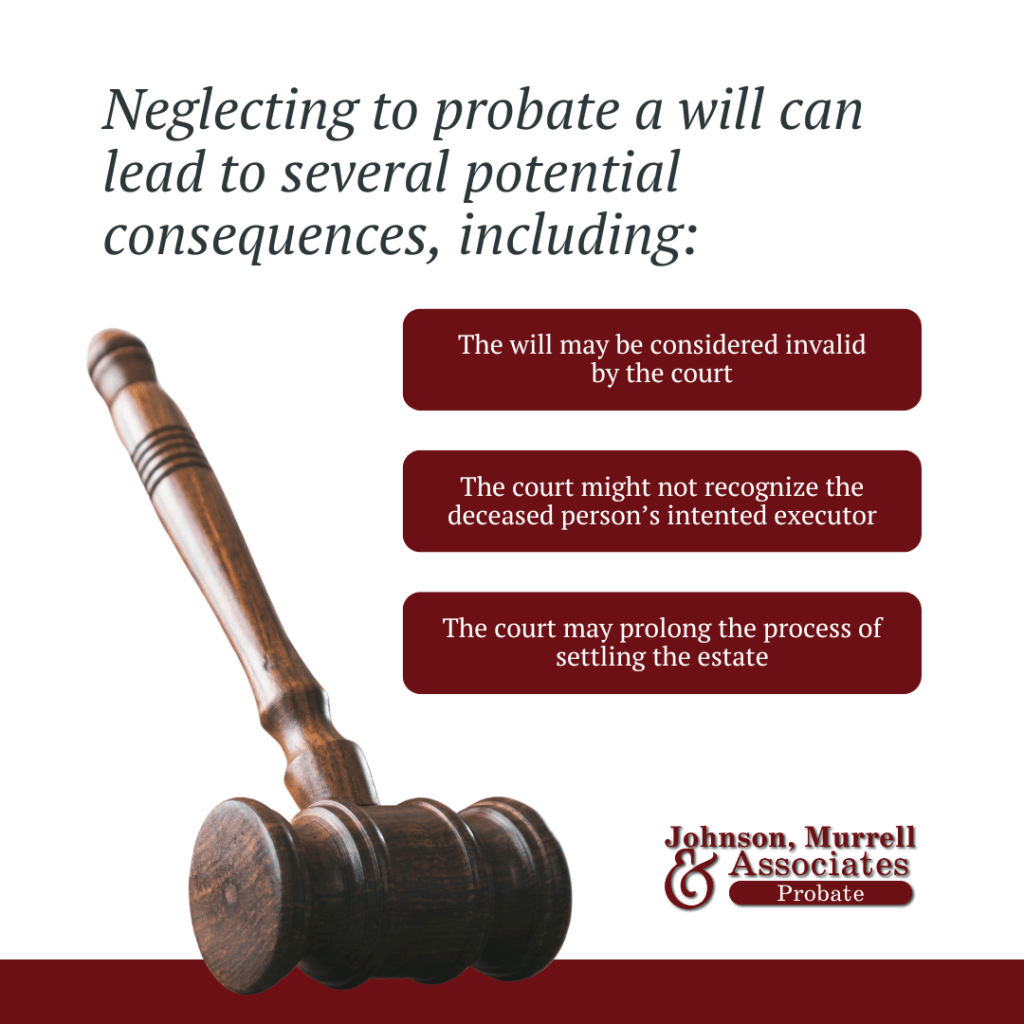Probate is typically required when a person passes away owning assets solely in their name without a designated beneficiary or joint owner. Probate is a legal process designed to ensure the orderly distribution of a deceased person’s assets and resolve any outstanding obligations.
In Tennessee, failing to probate a will can lead to long delays in the transfer of assets and potential legal disputes among family members. While it can seem daunting to consider probate in the aftermath of losing a loved one, the consequences of ignoring it can cause greater heartache and financial burdens.
If you don’t probate a will in Tennessee, the decedent’s assets may not be distributed according to their wishes and the executor identified in the will may not be recognized by the court. This could result in the court appointing a third party to settle the estate, causing time delays and increasing the cost of probate.
Consequences of Not Probating a Will in Tennessee
When a person passes away in Tennessee, their assets typically go through the probate process. Probate involves authenticating the will, settling debts and taxes, and distributing the assets to the designated beneficiaries.
Remember, a will is a legal document, but it needs to follow the validation process. Just as you need to visit the county clerk for a marriage certificate or pass a road test for a driver’s license, a will requires probate to carry its full weight. Failure to probate a will can lead to several potential consequences, including:

Failure to Disperse According to the Terms of the Will
If a will is not properly executed, it may be considered invalid by the court. This is especially likely with a handwritten will, which is more commonly contested. An invalid will means that the deceased person’s assets will not be distributed according to their wishes, potentially causing disputes and legal battles among family members. Instead, the assets would be distributed according to Tennessee’s intestacy laws, which may not align with the decedent’s intentions.
Loss of Control
Without probating a will, the court will not recognize the deceased person’s intended executor. This can jeopardize the executor’s authority and lead to a lack of control over the estate’s affairs. The court may even appoint someone to handle the administration of assets whose actions do not align with the deceased person’s wishes.
Prolonged Delays
Probating a will ensures a streamlined and organized process for distributing assets. Failing to probate a will can lead to prolonged delays in settling the estate, which can cause financial hardships for the beneficiaries and leave the estate vulnerable to potential mismanagement. Delays can also arise from legal disputes or challenges to the validity of the will, further complicating the process.
These delays can impede the timely distribution of assets and increase the costs associated with the probate process.
What Is the Purpose of Probate?
The probate process serves as an essential legal process that offers protection to all parties involved. It provides a transparent framework for executing the deceased person’s final wishes, ensures fair distribution of assets, resolves any outstanding debts, and protects the rights of beneficiaries.
Through probate, the court oversees the proper administration of the estate, verifying the validity of the will, and ensuring the decedent’s intentions are upheld.
Probate also safeguards against potential fraud or mismanagement of the estate, giving heirs and creditors a proper platform to address any claims or concerns. It provides a legal structure that promotes accountability and transparency, minimizing the risk of unauthorized actions or mismanagement of assets.
Probate Assistance
Navigating probate can be complex and overwhelming, especially during a time of grief. Johnson, Murrell, & Associates understands the intricacies of Tennessee’s probate laws and has over four decades of experience in handling probate cases. Our dedicated team of probate lawyers can guide you through each step of the process.
By choosing us for your probate needs, you can have peace of mind knowing that your loved one’s estate will be handled with care and expertise. Our commitment to providing personalized and comprehensive probate services makes us the ideal choice for anyone seeking professional probate assistance in Tennessee.

Ways to Streamline the Probate Process
To simplify probate in Tennessee, name beneficiaries for life insurance, annuities, retirement plans, and real estate, but be aware of creditor risks. Joint property ownership and a revocable living trust are probate-free alternatives, with the trust allowing control retention and specified asset distribution upon death.
Name Beneficiaries
Probate in Tennessee is necessary for assets solely owned by the deceased. Designating a beneficiary allows direct transfer to the named individual without probate for assets like:
- Life insurance
- Annuities
- Retirement plans
- Real estate
However, this can expose the assets to potential claims from the beneficiary’s creditors.
Own Property Jointly
Owning property jointly offers a streamlined alternative to probate. Similar to a beneficiary designation, this arrangement automatically transfers ownership to the surviving owner or owners, streamlining the probate process.
There are various ways to establish joint ownership:
- Joint tenancy with the right of survivorship transfers ownership directly upon death.
- Tenancy by the entirety offers a similar setup but is exclusive to married couples.
- Community property is acquired during a marriage, but it’s not available in Tennessee.
Create a Revocable Living Trust
Creating a revocable living trust allows you to transfer ownership of assets into the trust during your lifetime. You retain control and enjoyment of these assets, maintaining the ability to make legal decisions. Upon your death, the named successor trustee takes over, managing and distributing the assets according to your specified wishes. This process ensures a more efficient and private transfer of assets to beneficiaries while adhering to your directives.
If you’re looking for an attorney to carry the burden probate can bring, contact us to get the process started.
Probating a will in Tennessee is a necessary step to safeguard the interests of the deceased person’s beneficiaries and ensure the orderly distribution of assets. Failing to probate a will can result in dire consequences, such as the loss of control over the estate, prolonged delays in settling the estate, and increased probate costs.
It is crucial to recognize the importance of probate and seek the guidance of experienced professionals to navigate the probate process successfully. Don’t delay in taking the necessary steps to honor your loved one’s final wishes and protect the rights of all involved parties.
At Johnson, Murrell, & Associates, we understand that handling a loved one’s estate and bills after their passing is an emotional, stressful experience. Our job is to make your life easier, which means guiding you through the process so you understand what’s to come. To schedule a consultation, call us at 865-453-9943 or schedule an appointment.



